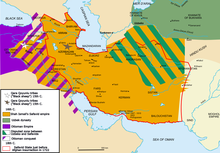Benjamin Moll
Benjamin Moll | |
|---|---|
 | |
| Born | June 29, 1983 |
| Nationality | German |
| Institution | London School of Economics |
| Field | Macroeconomics |
| Alma mater | University of Chicago (Ph.D., 2010) University College London (B.Sc., 2005) |
| Influences | Robert M. Townsend; Robert E. Lucas, Jr.; Abhijit Banerjee |
| Contributions | HANK; Continuous-time methods |
| Awards | Alfred P. Sloan Research Fellowship (2016); Best European macroeconomist under the age of 40, Bernacer prize (2017); Leverhulme Prize (2019); Economics in Central Banking Award (2019) |
Benjamin Moll (born June 29, 1983) is a German macroeconomist who is Professor of Economics at the London School of Economics.[1] He is the recipient of the 2017 Bernacer Prize for his "path-breaking contributions to incorporate consumer and firm heterogeneity into macroeconomic models and use such models to study rich interactions between inequality and the macroeconomy".[2]
Education and career
Benjamin Moll earned a BSc in economics from University College London in 2005, followed by a PhD in economics from the University of Chicago in 2010, under the supervision of Robert Townsend, Fernando Alvarez, Francisco Buera and Robert Lucas. After his PhD, he joined Princeton University where he was an Assistant Professor from 2011 to 2017, Associate Professor from 2017 to 2018, and Professor from 2018 to 2019. In 2019, he moved to the London School of Economics.[3]
Research
Cross-country income differences
In his earlier work, Moll showed that an important driving factor in determining the aggregate effects of poorly functioning credit markets is the persistence of idiosyncratic productivity shocks hitting producers. Higher persistence leads to smaller steady-state productivity losses and slower transition dynamics. He later reveals with David Lagakos, Tommaso Porzio, Nancy Qian and Todd Schoellman that wages increase twice as much with experience in rich countries compared to poor countries, supporting the claim that human capital accumulation plays a significant role in explaining cross-country income differences.[4]
거시경제학의 이질성
몰은 2018년 그레그 카플란, 지안루카 비올란테와 함께 뉴케인즈 모델에 가계 이질성을 접목한 신진 문학을 설명하기 위해 HANK(Hetheriol Agent New Keenesian) 모델이라는 용어를 사용했다. 이들은 통화정책이 대부분 표준적인 임시직간 대체채널이 아닌 노동시장에 대한 일반적 균형효과를 통해 작동한다고 주장한다. 이는 소비행태가 가처분소득의 변화에 강하게 반응하는 높은 MPC를 보이는 가구 중 상당수의 비율 때문이다. Ricardian 동등성이 HANK 모델에서 실패함에 따라, 통화 쇼크에 대한 재정 당국의 반응이 전반적인 거시경제 대응을 결정하는 데 핵심이다.[5]
평균 필드 게임 이론
몰은 이질적인 에이전트 모델을 해결하기 위한 여러 가지 연속 시간 방법을 개발하고 대중화했다. 수학자 이브 아흐두, 한제쿤, 장미셸 라스트리, 피에르루이 라이온스와 함께 평균 필드 게임 이론을 이용해 연속 시간에 일반 평형 모델을 재평가한다. 표준 아이야가리 모델은 가정의 최적 결정과 관련된 해밀턴-자코비-벨만 방정식과 재산 분배의 역학을 지배하는 관련 포크커-플랑크 방정식(콜모고로프 포워드 방정식)의 두 가지 주요 방정식으로 요약된다. 이 재시뮬레이션은 모델이 충분히 패러시밀할 때 분석 솔루션을 가능하게 한다. Moll과 그의 공동저자들은 그러한 연속 시간 모델을 수치적으로 해결하기 위해 유한 차이 방법을 대중화했는데, 이것은 이산 시간 모델에 비해 속도 향상을 가능하게 한다.[6]
명예
- 그는 뉴욕 대학교, 스탠포드 대학교, 매사추세츠 공과대학교, 시카고 대학교, 하버드 대학교, 런던 경제 대학교에서 방문 약속을 했다.
- 그는 미국경제저널(American Economic Journal) 공동편집자(Co-Editor, 2018-2020) 편집위원, 2020년부터 경제연구 검토위원, 2016년 2월부터 2017년 12월까지 통화경제학저널 부편집장을 역임했다.
- 2018년 레버훌메상(2019년)과 베르나체르상을 받았고, 알프레드 P상을 받았다. 슬론 연구 펠로우십(2016).
- 2021년 유럽경제협회 회원으로 선출되었다.[7]
참조
- ^ LSE 경제학과 완전 CV
- ^ Bank, European Central. "Benjamin Moll's contribution to macroeconomics". European Central Bank. Retrieved 2020-06-25.
- ^ "CV" (PDF).
- ^ "Research Statement" (PDF).
- ^ Bank, European Central. "Benjamin Moll's contribution to macroeconomics". European Central Bank. Retrieved 2020-06-25.
- ^ Achdou, Yves; Han, Jiequn; Lasry, Jean-Michel; Lions, Pierre-Louis; Moll, Benjamin (August 2017). "Income and Wealth Distribution in Macroeconomics: A Continuous-Time Approach". Cite 저널은 필요로 한다.
journal=(도움말) - ^ "Fellows EEA". www.eeassoc.org. Retrieved 2021-07-05.


